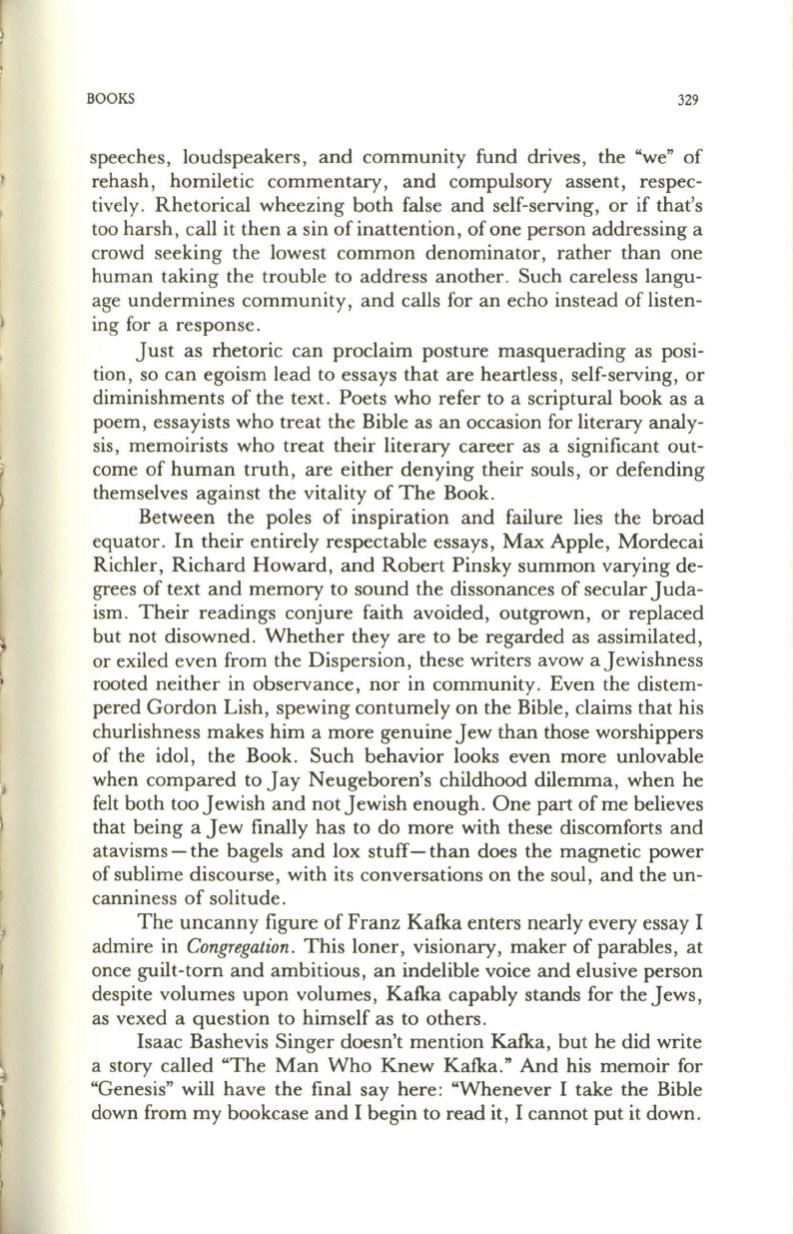
BOOKS
329
speeches, loudspeakers, and community fund drives, the "we" of
rehash, homiletic commentary, and compulsory assent, respec–
tively. Rhetorical wheezing both false and self-serving, or if that's
too harsh, call it then a sin of inattention, of one person addressing a
crowd seeking the lowest common denominator, rather than one
human taking the trouble to address another. Such careless langu–
age undermines community, and calls for an echo instead of listen–
ing for a response .
Just as rhetoric can proclaim posture masquerading as posi–
tion, so can egoism lead to essays that are heartless, self-serving, or
diminishments of the text. Poets who refer to a scriptural book as a
poem, essayists who treat the Bible as an occasion for literary analy–
sis, memoirists who treat their literary career as a significant out–
come of human truth, are either denying their souls, or defending
themselves against the vitality of The Book.
Between the poles of inspiration and failure lies the broad
equator.
In
their entirely respectable essays , Max Apple, Mordecai
Richler, Richard Howard, and Robert Pinsky summon varying de–
grees of text and memory to sound the dissonances of secular Juda–
ism. Their readings conjure faith avoided, outgrown, or replaced
but not disowned . Whether they are to be regarded as assimilated,
or exiled even from the Dispersion, these writers avow a Jewishness
rooted neither in observance, nor in community. Even the distem–
pered Gordon Lish, spewing contumely on the Bible, claims that his
churlishness makes him a more genuine Jew than those worshippers
of the idol, the Book. Such behavior looks even more unlovable
when compared to Jay Neugeboren's childhood dilemma, when he
felt both too Jewish and not Jewish enough . One part of me believes
that being a Jew finally has to do more with these discomforts and
atavisms - the bagels and lox stuff-than does the magnetic power
of sublime discourse, with its conversations on the soul, and the un–
canniness of solitude .
The uncanny figure of Franz Kafka enters nearly every essay I
admire in
Congregation.
This loner, visionary, maker of parables, at
once guilt-torn and ambitious, an indelible voice and elusive person
despite volumes upon volumes , Kafka capably stands for the Jews ,
as vexed a question to himself as to others.
Isaac Bashevis Singer doesn't mention Kafka, but he did write
a story called "The Man Who Knew Kafka." And his memoir for
"Genesis" will have the final say here: "Whenever I take the Bible
down from my bookcase and I begin to read it, I cannot put it down.


